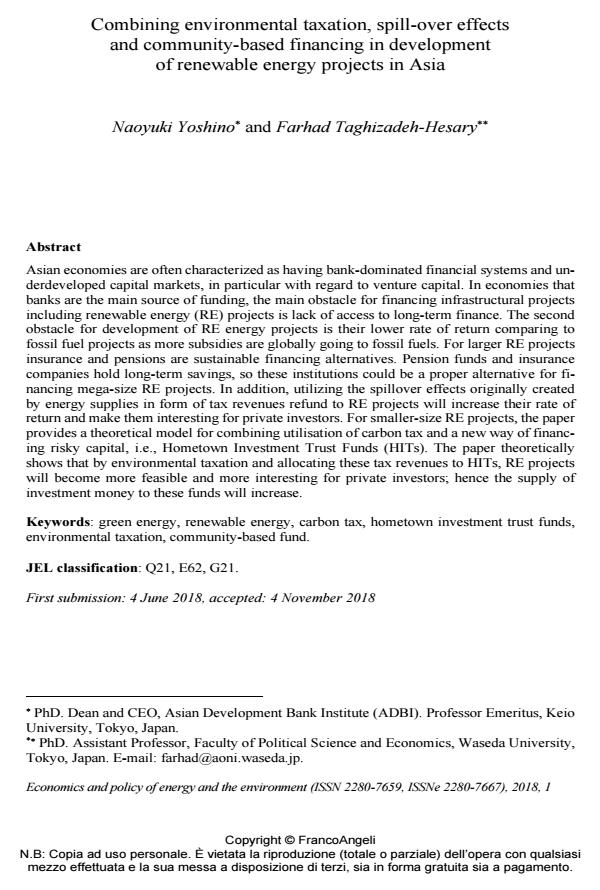Combining environmental taxation, spill-over effects and community-based financing in development of renewable energy projects in Asia
Titolo Rivista ECONOMICS AND POLICY OF ENERGY AND THE ENVIRONMENT
Autori/Curatori Naoyuki Yoshino, Farhad Taghizadeh-Hesary
Anno di pubblicazione 2019 Fascicolo 2018/1
Lingua Inglese Numero pagine 16 P. 133-148 Dimensione file 337 KB
DOI 10.3280/EFE2018-001006
Il DOI è il codice a barre della proprietà intellettuale: per saperne di più
clicca qui
Qui sotto puoi vedere in anteprima la prima pagina di questo articolo.
Se questo articolo ti interessa, lo puoi acquistare (e scaricare in formato pdf) seguendo le facili indicazioni per acquistare il download credit. Acquista Download Credits per scaricare questo Articolo in formato PDF

FrancoAngeli è membro della Publishers International Linking Association, Inc (PILA), associazione indipendente e non profit per facilitare (attraverso i servizi tecnologici implementati da CrossRef.org) l’accesso degli studiosi ai contenuti digitali nelle pubblicazioni professionali e scientifiche.
Asian economies are often characterized as having bank-dominated financial systems and underdeveloped capital markets, in particular with regard to venture capital. In economies that banks are the main source of funding, the main obstacle for financing infrastructural projects including renewable energy (RE) projects is lack of access to long-term finance. The second obstacle for development of RE energy projects is their lower rate of return comparing to fossil fuel projects as more subsidies are globally going to fossil fuels. For larger RE projects insurance and pensions are sustainable financing alternatives. Pension funds and insurance companies hold long-term savings, so these institutions could be a proper alternative for financing mega-size RE projects. In addition, utilizing the spillover effects originally created by energy supplies in form of tax revenues refund to RE projects will increase their rate of return and make them interesting for private investors. For smaller-size RE projects, the paper provides a theoretical model for combining utilisation of carbon tax and a new way of financing risky capital, i.e., Hometown Investment Trust Funds (HITs). The paper theoretically shows that by environmental taxation and allocating these tax revenues to HITs, RE projects will become more feasible and more interesting for private investors; hence the supply of investment money to these funds will increase.
Parole chiave:Green energy, renewable energy, carbon tax, hometown investment trust funds, environmental taxation, community-based fund.
Jel codes:Q21, E62, G21.
- Sustainable Development Goals and Pandemic Planning Farhad Taghizadeh-Hesary, Naoyuki Yoshino, Miyu Otsuka, pp.721 (ISBN:978-981-16-6733-6)
Naoyuki Yoshino, Farhad Taghizadeh-Hesary, Combining environmental taxation, spill-over effects and community-based financing in development of renewable energy projects in Asia in "ECONOMICS AND POLICY OF ENERGY AND THE ENVIRONMENT" 1/2018, pp 133-148, DOI: 10.3280/EFE2018-001006